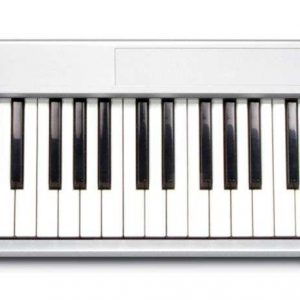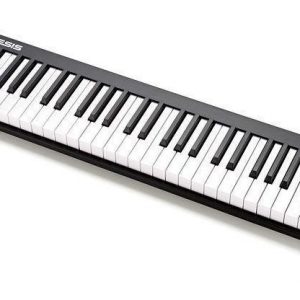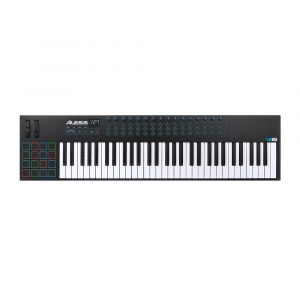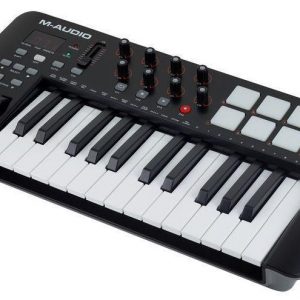Korg microKey2-49-Air
$73.99
The Korg microKey2-49-Air midi keyboard is the perfect solution for home recording or live performance.
Compare
Description
The Korg microKey2-49-Air MIDI device is a compact and portable MIDI keyboard that is perfect for musicians and producers on the go. This innovative piece of equipment boasts a range of features that make it ideal for use in both live settings and in the studio.
One of the standout features of the Korg microKey2-49-Air is its wireless connectivity. This allows you to control your music software without the need for a physical connection between the keyboard and your computer. This not only provides a cleaner aesthetic, but it also gives you more flexibility in terms of where you can set up your workspace.
Aside from its wireless capabilities, the Korg microKey2-49-Air is also notable for its smaller size. At just 27.56 inches wide and 5.51 inches deep, this keyboard can easily fit into smaller recording spaces or be taken along with you on the road.
Despite its compact size, the Korg microKey2-49-Air still manages to pack in plenty of features. The keyboard has 49 full-sized keys that are velocity-sensitive, meaning that the louder you hit them, the louder the resulting sound will be. Additionally, the keyboard features pitch bend and modulation wheels, as well as octave up and down buttons.
The Korg microKey2-49-Air is compatible with a wide range of music software, including Ableton Live, GarageBand, and Logic Pro X. It also comes with Korg’s M1 Le synthesizer software, which provides a range of classic sounds and effects that can be used to create unique and memorable tracks.
While the Korg microKey2-49-Air is designed with portability in mind, it still manages to provide a high level of performance and a wide range of features. Whether you’re a professional musician or a hobbyist, this MIDI keyboard is an excellent choice that can help you take your music to the next level.
Korg microKey2-49-Air properties
| Product name |
microKey2-49-Air |
| Brand |
Korg |
| Type |
Keyboard Instruments |
| Keyboard Instrument |
MIDI Keyboard |
Frequently Asked Questions:
What is the best way to connect my Korg microKEY 2-49 Air MIDI keyboard to my computer for use with music production software?
To connect your Korg microKEY 2-49 Air MIDI keyboard to your computer, follow these steps:
1. Turn off the Korg microKEY 2-49 Air MIDI keyboard by pressing the power button on the top right corner of the unit.
2. Locate the USB Type-C port on the left side of the keyboard. This is where you will connect your computer.
3. Find a USB Type-A to Type-C cable, also known as a USB-C to USB 3.0 cable. This type of cable allows for faster data transfer and is compatible with most modern computers.
4. Connect the smaller end of the USB Type-C to Type-A cable to your Korg microKEY 2-49 Air MIDI keyboard's USB Type-C port.
5. Plug the other end of the USB Type-C to Type-A cable into a USB port on your computer. Make sure your computer recognizes the keyboard by checking your device manager or system preferences (depending on your operating system).
6. Once connected, open your preferred music production software such as Ableton Live, Logic Pro X, FL Studio, or any other DAW you like to work with.
7. In your music production software, go to the MIDI settings and ensure that the Korg microKEY 2-49 Air MIDI keyboard is selected as your input device. You may need to restart your DAW if it doesn't automatically detect your connected keyboard.
8. Now you should be able to play notes on your Korg microKEY 2-49 Air MIDI keyboard and have them registered in your music production software.
Remember that if you have any issues with the connection or functionality, try updating both your operating system and your music production software to their latest versions. Additionally, make sure your Korg microKEY 2-49 Air MIDI keyboard's firmware is up-to-date by visiting Korg's website and following the instructions for updating it.
What is the total number of preset sounds and phrases available in the Korg microKey2-49-Air, and how can MIDI keyboard users access them during performance?
The Korg microKey2-49-Air comes with a total of 495 preset sounds and phrases. These are located within the device's internal memory and cannot be accessed through external storage devices or USB connections. MIDI keyboard users can access these presets by first navigating to the 'Sound Select' option in the main menu. From there, they can select any of the 495 available presets using the keypad on the bottom of the unit or their MIDI keyboard's pitch and velocity sensors. It is also worth noting that the Korg microKey2-49-Air allows users to save up to 50 custom sound settings for future use. These custom settings can be accessed through the device's 'User Setting' option in the main menu, where they will be listed under the 'Custom Sounds' section.
How can I ensure optimal connectivity and compatibility between the Korg microKey2-49-Air MIDI keyboard and various digital audio workstations and synthesizers?
To ensure optimal connectivity and compatibility between the Korg microKey2-49-Air MIDI keyboard and various digital audio workstations and synthesizers, follow these steps:
1. Make sure your DAW or synthesizer supports MIDI input and output. Most modern music production software does, but it's always worth double-checking to be sure. Connect the microKey2-49-Air keyboard to your computer using a USB cable (included). This will provide both power and MIDI communication between the keyboard and your DAW or synthesizer. If you're connecting the microKey2-49-Air to a synthesizer, use a standard MIDI cable (5-pin DIN) to connect the OUT port on the back of the keyboard to the IN port on your synth. Make sure your DAW or synthesizer is set up to recognize the microKey2-49-Air as a MIDI input device. This may involve going into the settings menu and selecting "Korg microKey2-49-Air" or something similar from a list of available devices. If you're using a DAW, make sure your audio interface (if applicable) is set up to recognize the microKey2-49-Air as well. This may involve going into the settings menu for your audio interface software and selecting "Korg microKey2-49-Air" or something similar from a list of available devices. Test your connectivity by playing a note on the keyboard. You should see MIDI data being generated in your DAW or synth's MIDI display, and you should hear sound coming from your synthesizer (if connected). Adjust any necessary settings in your DAW or synthesizer to customize how the microKey2-49-Air behaves and interacts with your software. This may involve things like assigning MIDI controllers to specific parameters, setting up MIDI maps, or adjusting MIDI quantization levels. Save your settings and start creating music! Remember that the microKey2-49-Air is a high-quality keyboard with a natural, responsive feel, so be sure to explore all its features and take full advantage of its capabilities in your productions.
How does the Korg microKey2-49-Air's semi-weighted keys and scaled soft touch provide a realistic playing feel for both pianos and synthesizers?
The Korg microKey2-49-Air's semi-weighted keys and scaled soft touch technology work together to provide a realistic playing feel that is ideal for both piano and synthesizer performances. The semi-weighted keys offer a more substantial feel than the lighter keys found on many compact keyboards, making them better suited to playing piano pieces with greater expression and dynamics. The scaled soft touch feature ensures that the action of each key is adjusted according to its position on the keyboard, so notes played in the lower register have a heavier touch while those higher up are lighter and more responsive. This not only feels more natural but also allows for greater accuracy and control when playing complex piano pieces or intricate synthesizer sequences. Overall, the combination of semi-weighted keys and scaled soft touch technology on the microKey2-49-Air delivers a realistic, expressive playing experience that is ideal for musicians who demand the best from their keyboard.
Before you buy Korg microKey2-49-Air






Reviews
There are no reviews yet.